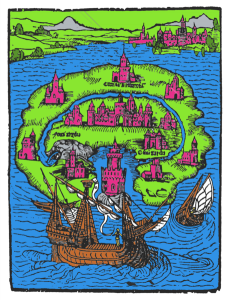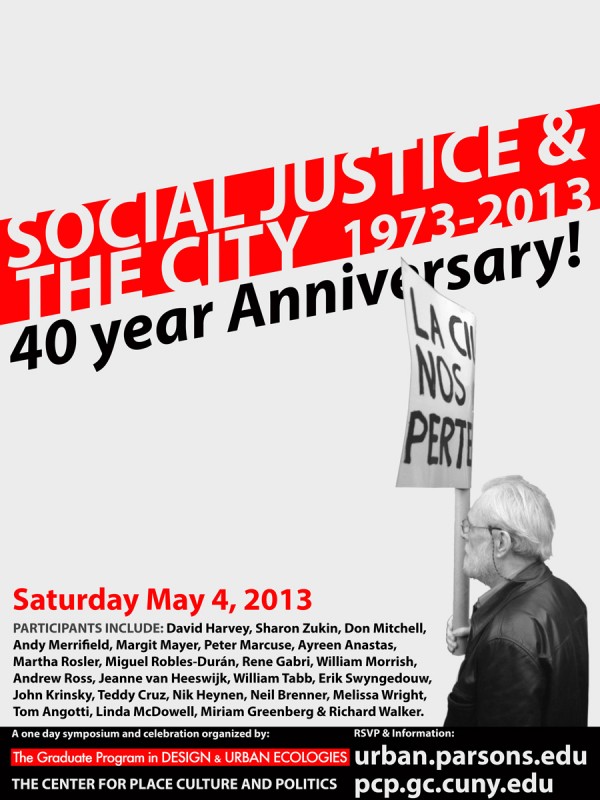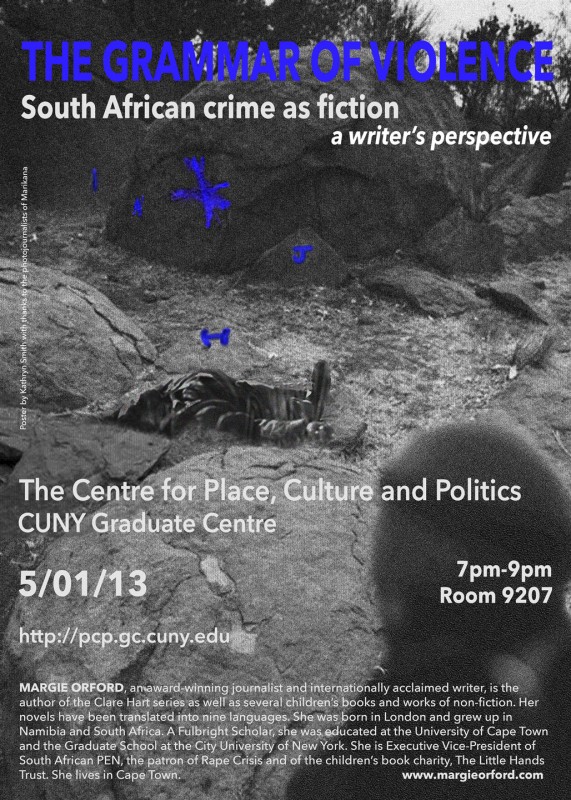When Mother Comes Home For Christmas, with filmmaker Nilita Vachani
10/09/2013
7:00 pm - 9:30 pm
Martin E. Segal Theatre
“When Mother Comes Home for Christmas” tells the story of a Josephine Perera, a widowed mother of three, who is one of thousands of Sri Lankan women who have left their country to earn salaries as domestic workers abroad.
A conversation with MALALAI JOYA
10/03/2013
7:00 pm - 9:00 pm
Skylight Conference Room, 9th Floor
Joya will speak on the current status of women in Afghanistan and what the future will look like when US troops are withdrawn. She will be joined by SHARMIN HOSSAIN, a member of the Ad Hoc Committee Against the Militarization of CUNY.
Book Party: A Companion to Marx’s Capital, Volume 2
10/02/2013
6:00 pm - 8:30 pm
Sociology Lounge, Room 6112
Join us to celebrate the publication of David Harvey’s A Companion to Marx’s Capital, Volume 2. We will also be celebrating the completion of the David Harvey’s Volume 2 video lectures, which comprise a semester-long open course now available on the web: http://davidharvey.org/reading-capital
CPCP party September 11, 5:30pm
09/11/2013
5:30 pm - 7:30 pm
Social Justice and the City: 40th Anniversary Celebration
05/04/2013
10:00 am - 6:00 pm
The New School
The Graduate Program in Design and Urban Ecologies at Parsons The New School for Design and The Center for Place Culture and Politics announces the 40 Year Anniversary Symposium of David Harvey’s Social Justice and The City (1973 – 2013), Saturday, May 4 from 10a – 6p at The New School, 66 West 12th Street, 404.
In April 1970, an essay titled “Social Processes and Spatial Form: An Analysis of the Conceptual Problems of Urban Planning,” was published in volume 25 of the journal Papers of the Regional Science Association. For this first time, this essay constructed an unexplored critique of urban disciplines vis-á-vis capitalism. The result created a dialectical theoretical framework, and forever changed the way many urban practitioners viewed their disciplinary tools and formal training. Ultimately, this heralded an ongoing formation of radically new and unseen forms of urban practice. In 1973, this essay became the first chapter of Social Justice and the City. David Harvey’s seminal second book split the way our cities are read, and created entirely new research paths for his contemporaries and younger practitioners.
Forty years after its publication, Social Justice and the City is as relevant as when it was first conceived. As the processes of urbanization fall faster than ever at the control of the elites, an unprecedented wave of enforced spatial segregation radically alters our urban realities. Today, Social Justice and the City provokes views and directions that remain at the core of any imaginary for resistance, and an action towards the belief that socially just forms of urbanization are possible.
The 40 year commemoration of Social Justice and the City will pay tribute to the lasting work and influence of David Harvey. The day will be introduced by Harvey, who will share his views on the book and its 40 year trajectory. Harvey will then be joined by a diverse array of urban practitioners, from artists to academics and designers, whose practice has been transformed by Social Justice and the City.
Participants Include: David Harvey, Sharon Zukin, Don Mitchell, Andy Merrifield, Margit Mayer, Peter Marcuse, Ayreen Anastas, Martha Rosler, Miguel Robels-Durán, Rene Gabri, William Moorish, Andrew Ross, Jeanne van Heeswijk, William Tabb, John Krinsky, Teddy Cruz, Erik Swyngedouw, Nik Heynen, Neil Brenner, Melissa Wright, Tom Angotti, Linda McDowell, Miriam Greenberg, Richard Walker and others.
RSVP & Information: urban.parsons.edu
Media Contact
Chris Chafin, The New School, 79 FIFTH AVENUE, 17TH FLOOR, NEW YORK, NY 10003. 212.229.5667 x3794, twitter.com/Urban_Ecologies
Understanding Shahbag: Bangladesh at a Crossroads
05/02/2013
6:00 pm - 9:00 pm
Martin E. Segal Theatre
This event will seek to provide a platform for analysis of the present political crises facing Bangladesh, by bringing together people from across the United States and Bangladesh who are academics, political commentators, activists, and students, for a discussion and dialogue with the audience.
The Grammar of Violence: Writing South African Crime as Fiction (A Writer’s Perspective)
05/01/2013
7:00 pm - 9:00 pm
Room 9206 and 9207, CUNY Graduate Center
Sanctions as a Tool of War: A Comparative Look at Iraq and Iran
04/29/2013
7:00 pm - 9:00 pm
Skylight Conference Room, 9th Floor
Sanctions are still presented in mainstream political discussion as a peaceful alternative to military intervention. But the experience of Iraqis, whose society was devastated by over ten years of harsh economic sanctions, shows us that sanctions against countries that defy Washington are a form of collective punishment used to augment the effects of war and/or lay the groundwork for war. While sanctions against Iran have yet to reach the levels and effects experienced in Iraq, there is much to be learned by placing these two different cases in a common frame. How are sanctions used by the US as part of its efforts to dominate the Middle East? What are the effects they have on everyday life and on social movements? And how have activists attempted to organize transnational solidarity to oppose sanctions? This event will look at previous campaigns against sanctions in Iraq and help launch a new campaign against the medical shortages caused by sanctions against Iran.
Speakers:
Dr. Joy Gordon is a philosophy professor at Fairfield University, JD from Boston University School of Law, PhD from Yale. Published extensively on the UN sanctions on Iraq, including “Invisible War: The United States and the Iraq Sanctions” (Harvard University Press 2010). Currently completing a book on the ethical aspects of economic sanctions.
Recently work on the Iran sanctions includes “UN Sanctions on Iran: The Dance of Mutual Deniability”
Denis J. Halliday worked for the UN for 34 years – first as junior officer in Iran (1964-66), and finally as UN Assistant Secretary-General 1994-98. He volunteered as the United Nations Humanitarian Coordinator in Iraq in 1997 and remained in his post until 1998 when he resigned in protest
of the sanctions.
Hadi Kahalzadeh served as an economist for Iran’s Social Security Organization from 2003 to 2011. He was a member of the Iranian Students Office for Consolidating Unity (Daftar-e Tahkim-e Vahdat), the only democratically elected student body across the country. After graduating, he joined the progressive political party, the Iranian Alumni Organization, which was a strong ally of student, women’s rights, and labor movements. In 2006, Hadi was elected as a member of board of directors of Iran Parties House (IPH). He currently serves as a visiting scholar at the department of political science at Valdosta State University in Georgia.
Bitta Mostofi currently is a nonprofit, immigrant rights attorney. She has also worked as a civil rights attorney and served on the board of directors of the Council on American Islamic Relations. Bitta has participated in anti-war and anti-sanctions campaigns, and was a co-coordinator for the Voices in the Wilderness; Iraq Peace Team from 2002-2003. In recent years Bitta has co-founded and worked with Where is my Vote, New York, which formed in the after math of the highly disputed 2009 Iranian presidential elections. WIMV-NY strives to raise the level of international solidarity with the citizens of Iran in their movement towards social justice and democratic change and to speak out against the Iranian state’s human rights violations.
Sina is a founding member of Havaar: Iranian Initiative Against War, Sanctions and State Repression and an organizer with Havaar’s campaign to alleviate sanctions-related medical shortages in Iran.
Co-sponsored by Havaar: Iranian Initiative Against War, Sanctions and State Repression, Raha Iranian Feminist Collective, War Resisters League and the Campaign for Peace and Democracy.
Please RSVP to our event posting on Facebook and help us spread the word.
The Iranian Initiative against War, Sanctions and State Repression
How to Organize a City: Bill Fletcher, Jon Liss, and Gihan Perera in conversation
04/25/2013
6:30 pm - 8:30 pm
Elebash Recital Hall
Thursday, April 25, 2013 from 6.30 – 8.30 pm in the Recital Hall
The Graduate Center, CUNY. Free and open to the public.
How can urban social movements cohere with existing institutions of power, from unions to local government? As importantly, how can movements collaborate with each other to achieve broader, systemic changes? Can these movements and political projects realistically be anti-capitalist? Activists and leaders Bill Fletcher, Jon Liss, and Gihan Perera will discuss these issues in an open forum.
BILL FLETCHER, JR. is the immediate past president of TransAfrica Forum; a Senior Scholar with the Institute for Policy Studies; an editorial board member of BlackCommentator.com; and in the leadership of several other projects. Fletcher is the co-author (with Peter Agard) of “The Indispensable Ally: Black Workers and the Formation of the Congress of Industrial Organizations, 1934-1941″; the co-author (with Dr. Fernando Gapasin) of “Solidarity Divided: The crisis in organized labor and a new path toward social justice“; and the author of “‘They’re Bankrupting Us’ – And Twenty other myths about unions.” Fletcher is a syndicated columnist and a regular media commentator on television, radio and the Web. www.billfletcherjr.com
JON LISS has organized for racial and social justice in Virginia for the last 30 years. Between 1979-1981, he organized for the creation of an African American Studies department as a student at the University of Virginia. He graduated with a B.A. in History in 1981, and continued his organizing for US divestment in the South African Apartheid regime. From 1983-1984, he served as an elected leader of a taxi drivers association. In 1986, Jon co-founded Tenants and Workers United (TWU), a low-income racial and gender justice organization based in the Arlandria-Chirilagua neighborhood. Jon served as the Executive Director of TWU until 2011. In 2007 he co-founded Virginia New Majority and currently serves as both a board member and as the organization’s Executive Director.
GIHAN PERERA is co-founder and former Executive Director of the Miami Workers Center, a community organizing institution for low-income Black and Latino communities in South Florida. His decade-plus leadership of the center helped turn it into a national peer anchor to a number of strategic initiatives including the US Social Forum, the Right to the City Alliance, and a number of other efforts to build the theory, practice and capacity of work happening at the intersection of race, gender, the economy and the environment. He is currently the Executive Director of the Florida New Majority, a statewide civil rights and civic engagement organization that is working to connect and empower Florida’s diverse communities.
Moderated by David Harvey, Director of the Center for Place, Culture and Politics.
The African Spring: Frantz Fanon Today and the Legacy of Revolutionary Humanism
04/23/2013
6:30 pm - 8:30 pm
Room 9204
A Conversation with Drucilla Cornell
April 23, 2013 from 6.30 – 8.30 pm, Room 9204/9205
Frantz Fanon’s work is so significant to us today because it continues to give us an entirely different philosophical perspective on the ethical and political significance of a new way of being human together. Fanon both rejects traditional European narratives of why humans are unique and deserving of dignity and those anti- or post-humanists who argue that we are already beyond the human, either through evolution or in a political and ethical sense. To put it simply: the colonial situation is one of systematic dehumanization. The human, however, is not a set of attributes, whether real or ideal. Instead, what it means to be human together in a world beyond the terrifying brutalities of colonialism is only to be found in the revolutionary struggle itself.” (Drucilla Cornell)
Discussants: David Harvey, Peter Hitchcock, and Kyoo Lee
DRUCILLA CORNELL is Professor of Political Science, Women’s Studies and Comparative Literature at Rutgers University. Prior to beginning her life as an academic, Cornell was a union organizer for a number of years. She worked for the UAW, the UE, and the IUE in California, New Jersey, and New York. She is the author of Defending Ideals: War, Democracy, and Political Struggles (2004) andMoral Images of Freedom: A Future for Critical Theory (2007), among other books.
















